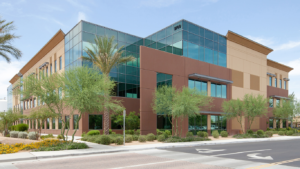Among the many workplace issues COVID-19 unearthed, the state of diversity, equity and inclusion (DEI) has remained paramount. Among commercial real estate (CRE) entities keeping a close watch on the state of DEI in the wake of the pandemic (and long before it) is Commercial Real Estate Women (CREW) Network. In 2020, the research-driven organization published an in-depth benchmark study, revealing key commercial real estate workplace diversity findings.
DEEPER DIVE: 23 most influential minority business leaders in Arizona
More recently, the organization distributed a 2022 CREW Network research paper providing insight into workforce priorities and commercial real estate diversity improvements.
Locally, the Phoenix CREW chapter — AZCREW — takes a look at what CRE companies, educational institutions and other entities are doing to encourage and build a more diverse workforce for the future.
COVID-19 key findings
Research repeatedly demonstrates that any inequities in DEI prior to the pandemic, were accentuated during — and in the wake of — COVID-19. For example, in September 2020, a McKinsey report revealed that only 53% of the adult Black population was employed, compared with 57% of the adult white population. Latinos and Hispanics faced similar imbalances. And, women with children forced to reduce their work hours were at a rate four to five times higher than fathers.
Now, three years following McKinsey’s data (and similar research), where does workforce diversity stand? Globally, there is still work to do. The Harris Poll, State of Inequity 2023: Envisioning a Post-Pandemic Workplace study revealed that the majority of Black, Indigenous and People of Color (BIPOC) still “see little progress,” when it comes to building a more equitable environment for employees of color.
When zeroing in on the commercial real estate (CRE) industry specifically, DEI — while still in need of improvement — has experienced some positive change.
For example, according to the latest workforce research conducted by CREW — which included 1,200 CRE professionals across five countries — more than 92% of respondents said their companies are inclusive, “providing equal access to opportunities and resources for people who might otherwise be excluded or marginalized, such as those having disabilities or belonging to other minority groups.”
Importance commercial real estate diversity
Additionally, CREW revealed that 75% of workers and job applicants view a diverse workforce as important when considering companies and job offers.
Even though CREW’s latest feedback shows that many employees feel a sense of inclusivity in the workplace, as well as desiring diversity in their chosen employment, there is still room for growth. Among areas of desired improvement are mentors and sponsors and initiatives designed to help women attain positions in the C-suite, especially amongst women of color.
The good news is that because of research such as what CREW Network has produced, measures are being taken globally, nationally and locally to rectify workforce diversity imbalances in the CRE, construction and related industries.
“There are many efforts by the construction industry to move diversity, equity and inclusion throughout the country,” says Kent Lane, manager, supplier diversity and community outreach for McCarthy Building Companies. “One of the largest efforts is around Construction Inclusion Week (CIW), which is the first organized effort to harness the collective power of general contractors, specialty contractors, subcontractors, organizations and suppliers.”
Making strides
In 2022, CIW more than doubled participation from its inaugural year of 2021 with 1200 participants to 3,000 firms registered to participate — a 150% increase.
Adds Lane, “Women in Construction Week (celebrated in March each year) is widely celebrated across the industry and both supports and encourages women in construction.”
One local education outlet that has been particularly successful in its efforts to diversify the workforce is Mesa Community College.
Women can take advantage of MCC’s EDGE3 Women in Electronics Scholarship, designed for students in automotive service, automated industrial technology, Caterpillar technician training, electronics technology and/or engineering pathways.
Another one of MCC’s newer programs and shining star for encouraging workforce diversity is the Semiconductor Technician Quick Start program — a 10-day semiconductor manufacturing workforce development initiative in partnership with Intel and Fresh Start.
“As a woman, my first thought was how can we get more women into this?” says Leah Palmer, executive director of AzAMI Workforce for Maricopa Community Colleges. “If we don’t make it doable for women they won’t attend. And that is how we decided we needed to hold [Quick Start courses] two times a day — because women have children in day school and preschool.”
Knowledge is power
In addition to offering day and night options for the semiconductor manufacturing classes, MCC further sought to encourage diversity and inclusion by allowing participants to enroll for free.
“We could not make [enrollees] pay upfront, or we would lose a lot of people,” Palmer says, “so we let them enroll for free and then we said we’d clear off their debt when they successfully completed the program.”
Quick Start — also available at Chandler-Gilbert Community College – Williams Campus and Estrella Mountain Community College — has yielded tremendous interest and success so far.
According to Palmer, there are 438 students currently enrolled.
Of Quick Start’s participants, Hispanic and Latino enrollees are 39%, Black students make up 13% and Asian participants add up to 8%.
Prior to the Quick Start program, MCC had a similar education model with Boeing, which also encouraged diverse applicants. As for moving forward, this type of educational structure could assist in diversifying other industry workforces, notes Palmer, including CRE.
“I don’t care what sector you’re in,” she says. “The model definitely removes barriers where there’s paralysis.”
Recipe for change
Outside of education, numerous commercial real estate businesses
are proactively working to establish DEI protocols in their hiring and training processes.
“We have an Emerging Business Inclusion (EBI) program which builds relationships with minority, women, veteran and disadvantaged business enterprises (MWVDBE),” says Alisa Timm, vice president of Management and Building Services for Ryan Companies.
“Our DEI strategy has multiple interconnected focus areas in education, recruiting, stewardship and creating safe spaces for our employees where self-expression is encouraged and respected.”
As another local example, Clayco has been a proponent of DEI practices for close to 30 years, according to Sandra Porter Marks, senior vice president at Clayco. Among its many DEI initiatives, the company created Clayco Rising — one of the most comprehensive diversity and inclusion program in the country — designed to create meaningful opportunities for Clayco employees, and the communities and organization it serves, Marks notes.
“Additionally, Clayco has raised over $350,000 for its Juneteenth Fund since its inception,” Marks says. “From this fund, donations were sent to different Black organizations working to better their communities.”
Marks further explains that Clayco’s goal is to see an increase in the representation of minorities and women in the trades overall, not just on projects with client-directed onsite workforce goals or municipal standards.
Growing the roster
McCarthy Building Companies, known for its dedication to bolstering a diverse workforce in construction, has partnerships with several organizations, including Fresh Start’s Career Jump Start for Women, the Greater Phoenix Chamber’s Build Your Future program, Arizona Builders’ Alliance Women in Leadership training, ACE Mentoring as well as various programs and initiatives through Women In Transportation (WTS), the Associated Minority Contractors of Arizona (AMCA) and the Association of General Contractors (AGC).
Added to a continually growing roster of Arizona companies on a mission to improve and build workforce diversity in commercial real estate, are organizations such as AZCREW. Backed by CREW’s national CRE Pledge for Action, AZCREW is doing its part to encourage local companies to sign the CRE Pledge to advance women and other individuals in underrepresented groups.
“You can influence people most effectively on a personal level by authentically supporting their professional growth, encouraging them to be bold, and exemplifying courage by sharing your failures and successes,” Timm says. “I have been involved in AZCREW for my whole 30-year career and have met women from all backgrounds. We need to continue to show women that they can go into property management, construction, brokerage and development. If you are in one of those fields, share your time generously and future leaders
will take the next steps to strengthen the workforce.”




